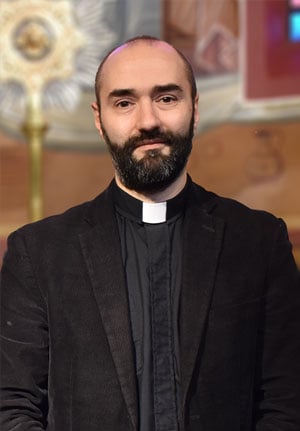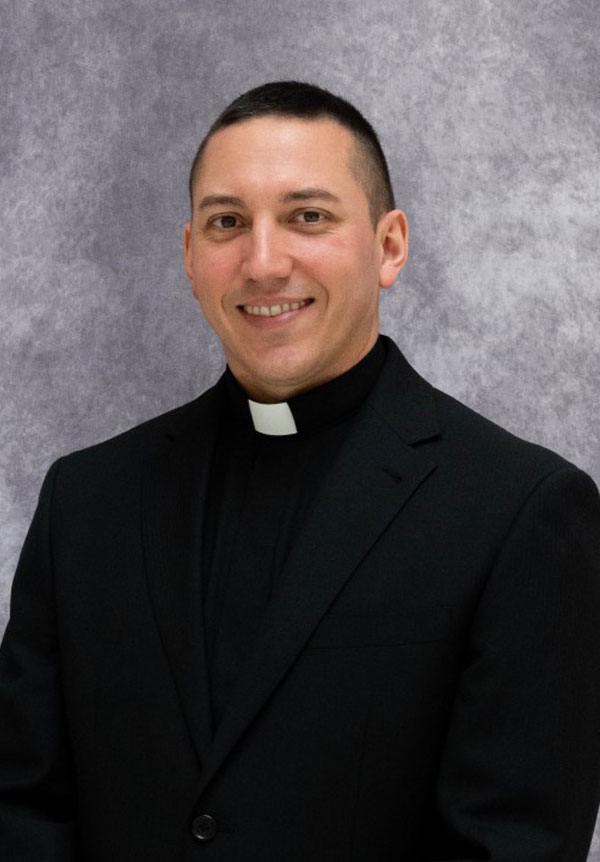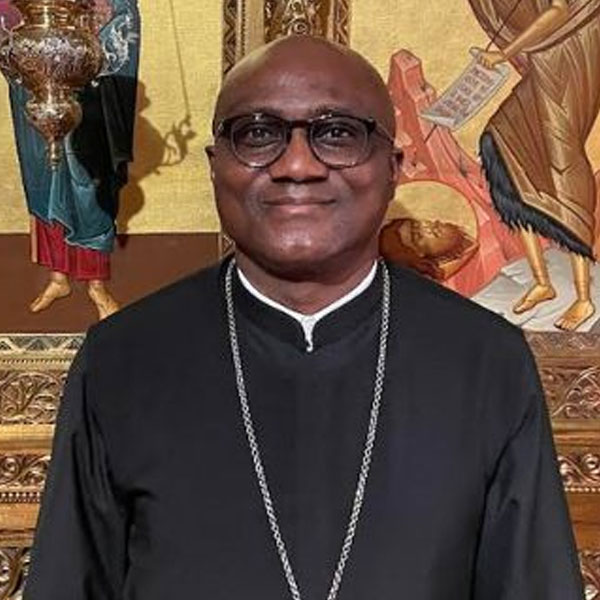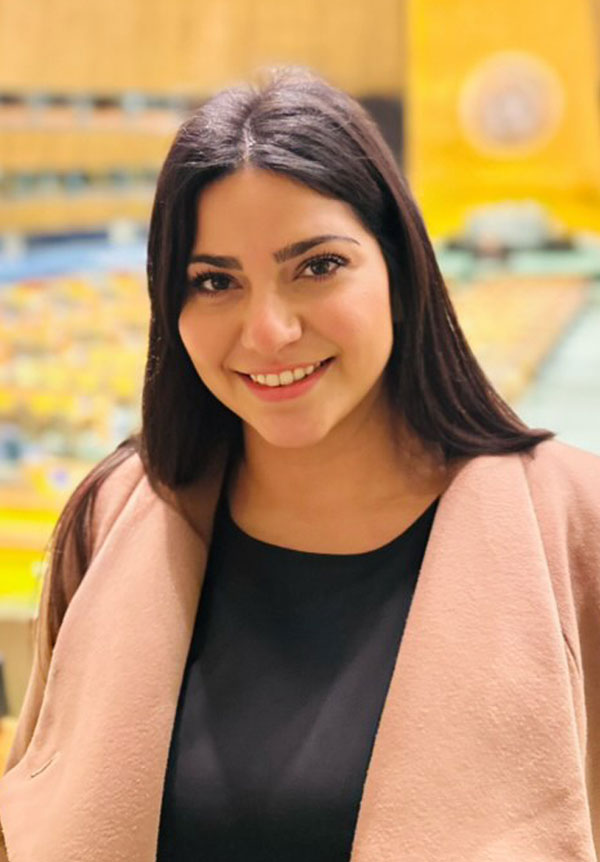Tel.: +1 (212) 570-3593
Email: [email protected]
The Department of Inter-Orthodox, Ecumenical and Interfaith Relations is tasked with cultivating professional relationships with faith-based organizations, academic institutions, and NGOs. It coordinates the ecumenical and interfaith dialogues of the Archdiocese on a national level and is responsible for pan-Orthodox activities through the Office of the Chairman of the Assembly of Canonical Orthodox Bishops of the USA.
;
Ecumenical Officer and Director, Department of Inter-Orthodox Ecumenical and Interfaith Relations
Director of Programs, Department of Inter-Orthodox, Ecumenical, and Interfaith Relations
Project Coordinator Mission and Outreach Development
Project Coordinator for the UN and Special Assistant, Department of Inter-Orthodox Ecumenical and Interfaith Relations
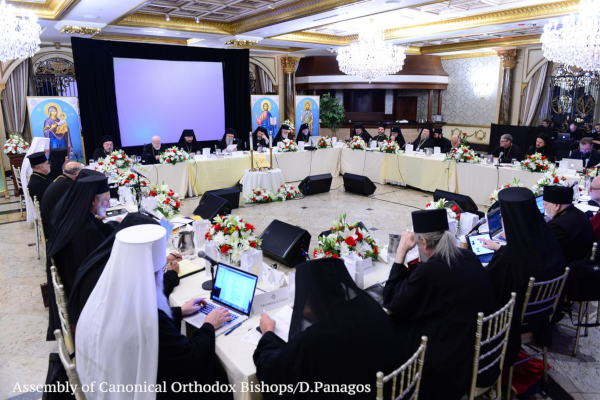
As the exarch of the Ecumenical Patriarchate, the Archbishop is the Chair of the Assembly of Canonical Orthodox Bishops of the United States of America. As such, the Department supports the Chairmanship of the Assembly by planning the annual meeting, staffing the Orthodox-Catholic dialogues, liaising with the secretariat and other hierarchs. Furthermore, the Department handles all Archdiocesan interactions with the other Orthodox Christian jurisdictions, generally, including in the United States of America and abroad.
The Department is responsible for all the inter-Christian memberships and dialogues in the United States of America. It also maintains relationships with individuals and other churches including the Oriental Orthodox Churches and the Roman Catholic Church.
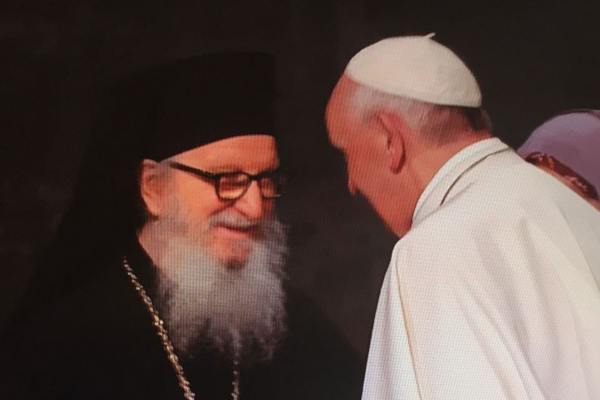
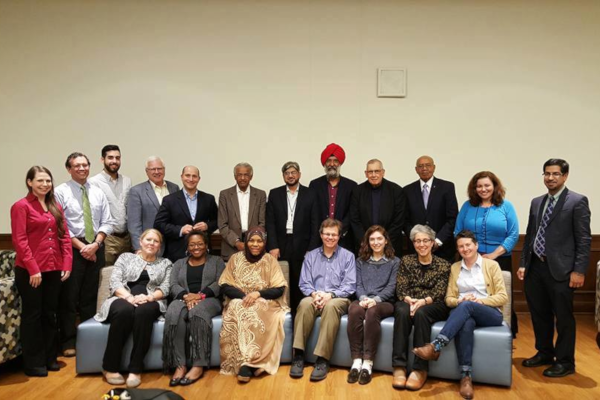
The Department interfaces with an infinite number of other religions and faith groups, for example Judaism, Islam, Buddhism, Hinduism, etc. The primary platforms of engagement, aside from bilateral relationships, are through institutional partnerships.
Whether developing relationships under the umbrella of Inter-Orthodox, Ecumenical or Interfaith, the Department follows two basic tracks: 1) theological dialogue and 2) united action on social issues. Furthermore, Orthodox Christian implementing agencies and organizations fall under the Assembly. Due to this significant overlap, the Archdiocese’s engagement on social issues has always been a responsibility and mandate of the Department.
The primary outlet for Department’s social engagement is through its work at the United Nations (“UN”), which the Department considers UN Programs a pan-Orthodox ministry of the Archdiocese.
Both the UN, but also externally, the Department works from a human rights perspective on human trafficking, water and sanitation, public health, racism, creation care (the environment), gender equality, children and youth, Middle East peace, the refugee crisis, and much more.
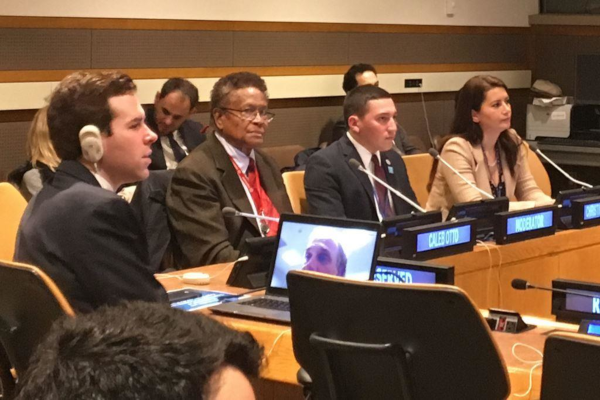
Patriarchal Endorsement | Archiepiscopal Foreword | Executive Summary | Preface
In June 2017, His All-Holiness Ecumenical Patriarch Bartholomew appointed a special commission of theologians “to prepare a formal document on the social doctrine of the Orthodox Church, as this has been reflected and expressed in the tradition through the centuries and by the Ecumenical Patriarchate in contemporary practice, particularly as recently adopted in the documents and decisions of the Holy and Great Council held in Crete in June 2016.” The mandate of the special commission was “to submit a text in timely manner for consideration and approval by the Holy and Sacred Synod of the Church of Constantinople. The fruit of this deliberation and composition will subsequently be published for the benefit of our faithful throughout the world in order to serve as a solid foundation for reference and conversation on vital issues and challenges facing the world today.”
In December 2017, the Ecumenical Patriarch issued a formal encyclical “to the Hierarchs of the Throne, who have assumed the burden of pastoral service to the spiritual children of the Ecumenical Patriarchate and who experience the present issues and enormous challenges first-hand, thereby acquiring a pastoral experience that is most precious for the entire Body of the Church for the purpose of addressing these matters,” requesting that each provide suggestions “concerning the nature of the signs of our times as well as ways of responding to these challenges in the spirit of the Orthodox spiritual and pastoral tradition” and encouraging each of them “to submit a report on the urgent social problems” faced by the faithful today, as well as “a pastoral response in the context of an Orthodox ecclesiastical witness in the modern world.” Over the next two months, more than twenty-five eparchies of the Ecumenical Throne responded in detail, many of them inviting clergymen and theologians, specialists and scholars, as well as social workers and civil leaders to contribute to an informed report.
After formal submission to the Holy and Sacred Synod in September 2019, the commission document was referred for assessment to Hierarchs of the Synod and Hierarchs of the Eparchies in October 2019. In January 2020, the Holy and Sacred Synod “favorably evaluated this comprehensive document, formally expressing its commendation and congratulations as well as its wholehearted gratitude for the extraordinary response and exceptional work of the commission, while approving the statement for publication by the members of the commission in order to provide parameters and guidelines for the social responsibility of the Orthodox Church before the challenges and perspectives of today’s world, without at the same time overlooking the favorable potential and perspectives of contemporary civilization.”
The text approved by the Holy Synod was subsequently supplemented by material from prominent Hierarchs of the Ecumenical Throne and edited by the commission for final publication.
The task of producing a single statement of the social doctrine of the Orthodox Church is of its nature a complicated, not to say contentious, undertaking. The Orthodox Church operates within a vast variety of cultural and historical contexts, each with its own social and political concerns and traditions. The Church regards its social teaching as nothing other than a faithful transcription of the moral teachings of the gospel into the language of public ethics and policy, and insists that every Orthodox Christian is called to live in the world as a faithful disciple of Christ, called to fellowship with the whole communion of saints. That said, the process of translating the commands of Christ into the principles of social life is always a delicate matter, often ambiguous, and rarely easy; thus any reflection on Orthodox social doctrine must rely upon the accumulated experience and wisdom of the Church as a whole, throughout the world and throughout her history. Orthodox tradition has continuously grown and been enriched in the course of its journey through the centuries, and from that long experience the Church ceaselessly draws guidance—signposts along the way, so to speak—in reflecting upon social and ethical issues. As Fr. Georges Florovsky observed: “The Church gives us not a system, but a key; not a plan of God’s city, but the means of entering it.”[1]
In our time, the Church frequently finds itself ill-prepared to respond to the realities of pluralism and globalization, or for that matter of individualism and secularization. In many societies, the Church is tempted simply to stand in opposition to the world, often sweepingly denouncing and despising all its forms and fashions. All too often, those who presume to speak for Orthodox tradition believe that the Church can preserve her integrity only by turning blindly away from the present and uncritically toward the past, seeking shelter in a petrified and sentimentalized vision of the Christian orders of earlier centuries. Holy tradition, however, is much more than a static deposit inherited from the past, requiring nothing more than assiduous curatorship and rote repetition. It is not simply a memorial to the words of the Fathers of old, but is rather the living and dynamic reality to which those words pointed, the ever abiding presence of the Holy Spirit who descended on the Apostles at Pentecost, a constant and ever-new pilgrimage toward the Kingdom that is to come. It is this living tradition that inspires the Church to recover its sacred calling and that endows her with the divine courage to transform the world with all its new challenges from within, “to offer witness not so much from a polemical perspective, but from that of an ‘incarnational’ mission, following the example of the incarnate Word by speaking to the contemporary world ‘from within’—bearing its crosses and striving to understand its anguish.”[2]
The Orthodox Church has long nurtured within herself a strong and distinctive social instinct, one that has often risen to the surface when historical circumstances have been propitious, and that even now constitutes her principal contribution to modern discussions of social ethics. Metropolitan Kallistos draws a clear connection between this social conscience and the doctrine of the Holy Trinity: “Our belief in a Trinitarian God, in a God of social inter-relationship and shared love, commits us to opposing all forms of exploitation, injustice, and discrimination. In our struggle for human rights, we are acting in the name of the Trinity.”[3] And Mother Maria Skobtsova (St. Maria of Paris) sees the Church’s social vision as emanating from the sacrament of the Eucharist: “If at the center the Church’s life there is this sacrificial, self-giving Eucharistic love, then where are the Church’s boundaries, where is the periphery of this center? Here it is possible to speak of the whole of Christianity as an eternal offering of the divine liturgy beyond church walls . . . and the whole world becomes the one altar of a single temple.”[4]
In attempting to articulate Orthodox social doctrine in terms appropriate to modern realities—which was inevitably a somewhat monumental task—the commission strove to remain mindful of certain fundamental concerns specifically identified by His All-Holiness Ecumenical Patriarch Bartholomew, as well as of others identified by those Hierarchs of the Ecumenical Throne around the world who took the time to communicate their most urgent pastoral concerns. These guidelines served as general parameters, not as rigid boundaries, but they provided the commission inestimable aid in discharging its extraordinary responsibility. In adhering to those guidelines, moreover, the commission tried to avoid nebulous abstractions and sweeping generalizations, preferring to offer specific principles for consideration and adoption by the faithful and their communities. In regard to every topic addressed, the commission sought to remain faithful to the historical teachings of the Church, even in attempting to bring those teachings into direct engagement with modern concerns. It endeavored to steer well clear of simplistic, pietistic, or legalistic pronouncements, but it sought no less sedulously to avoid presenting the personal opinions of its members as authoritative statements of Orthodox teaching. No claim is advanced in these pages that was not arrived at through a scrupulous contemplation of the biblical, patristic, dogmatic, and theological sources of the tradition as a whole. Finally, conscious of the constant struggle of all Christians to live faithful lives in a frequently unsettled and uncharitable world, the commission sought to abstain altogether from the language and intonations of judgment or condemnation.
The document aspires to reflect the worldview and mission of the Ecumenical Patriarchate, as expressed both down the centuries, up to the present day. Though the structure and style of this text are rather formal, the commission strove to avoid empty abstraction and to offer concrete moral proposals. The document’s intentions are purely pastoral, moreover; its analysis of the present is meant to be compassionate, its critiques strictly constructive, and its exhortations studiously humble. If it fails in any of these respects, the commission takes full responsibility for the deficiency. It was undertaken, moreover, with a genuine willingness to learn not only from the wisdom of earlier generations, but also from the mistakes, as well as to learn from one another in the communion of the Church. In this regard, the members of the commission submit this service to the church at large as a preliminary step toward a far more expansive theological dialogue and as an aid to spiritual growth for the Orthodox faithful.
David Bentley Hart & John Chryssavgis
It was a profound honor to be appointed members of this special commission and a distinctive privilege to be assigned this mandate by His All-Holiness Ecumenical Patriarch Bartholomew. The members of the commission express their thanks for his confidence, auspices, and endorsement.
His Eminence Archbishop Elpidophoros of America was generously and graciously supportive of the publication of this statement online, in translation, and in print.
We are grateful for the invaluable insights of Elder Metropolitan John of Pergamon (Ecumenical Patriarchate) and Metropolitan Kallistos of Diokleia (University of Oxford).
Moreover, we recognize the support of Metropolitans Savas of Pittsburgh, Evangelos of New Jersey, and Nathanael of Chicago. Metropolitan Methodios of Boston and the Department of Inter-Orthodox, Ecumenical, and Interfaith Relations of the Greek Orthodox Archdiocese of America (through a grant of Leadership 100) sponsored the translation of the document into several languages.
[1] Georges Florovsky, “The Catholicity of the Church, in Bible, Church, Tradition: An Eastern Orthodox View, Collected Works, vol. 1, Belmont, MA: Nordland, 1972, 50.
[2] Metropolitan John [Zizioulas] of Pergamon, in Person, Eucharist, and Kingdom of Heaven: Orthodox and Ecumenical Perspectives. Essays in Honor of Metropolitan John [Zizioulas] of Pergamon, eds, Pantelis Kalaitzidis and Nikolaos Asproulis, Volos: Dimitrias Editions, 2016, 332 [In Greek].
[3] Metropolitan Kallistos Ware, “The human person as icon of the Trinity,” Sobornost, 8.2 (1986), 6–23 at 18.
[4] Maria Skobtsova, “Types of Religious Life,” Mother Maria Skobtsova: Essential Writings, Maryknoll, New York: Orbis Books, 2002, 185.
